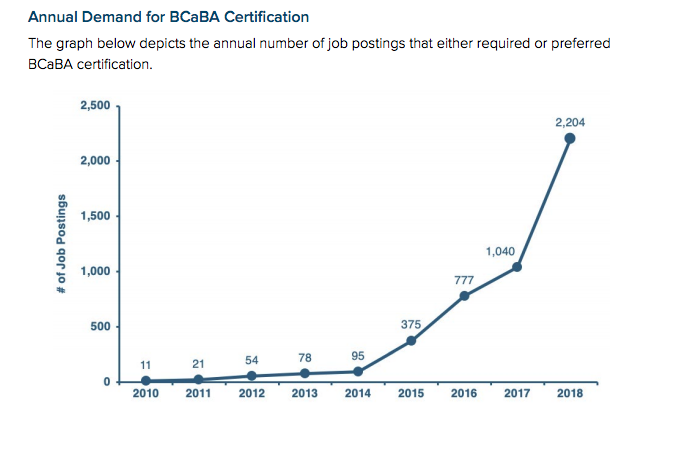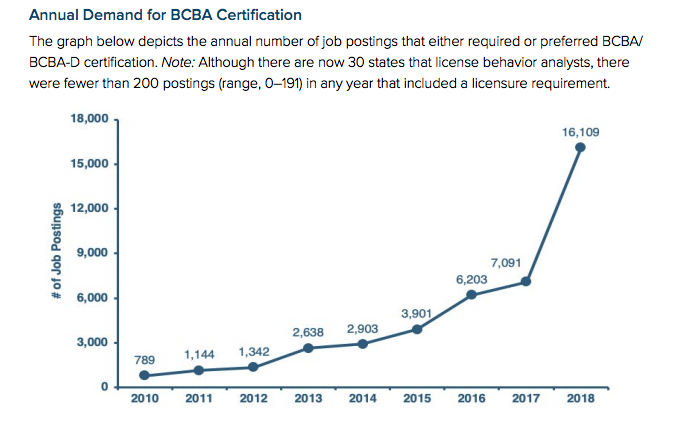Applied Behavioral Analysis (ABA) is one of the fastest-growing areas in the psychology and behavioral health science disciplines. Behavioral analysts are in high demand given the method’s effectiveness and the critical shortages of workers with this sought-after training. This training offers a systematic approach to understanding and modifying human behavior to positively impact society as a whole.
Read on to learn more about the role and career outlook to understand if ABA might be the right path for you.
What Is Applied Behavioral Analysis?
ABA is a specific therapeutic approach to understanding and changing behavior. While it is most commonly associated with intervention for individuals and families affected by autism spectrum disorders, it is also utilized in response to the escalating opioid and mental health crises happening worldwide.
What Do Behavior Analysts Do?
The field of ABA attracts conscientious professionals who want to make a difference in the lives of others. ABA is unique, as it takes a comprehensive approach to behavior. It focuses on working to change an environment to influence positive behavioral change.
ABA therapy evaluates behavior in a way that allows for replacing undesired behaviors with more appropriate ones. It doesn’t merely focus on “bad” behavior, but instead uses positive reinforcement to bring about desired changes.
Where Do Behavior Analysts Work?
ABA therapy is used in a variety of places such as medical institutions, educational settings, and in at-home interventions. Since it serves a wide range of populations, ABA therapists often have flexible schedules that allow for greater work-life balance. There are a variety of ways professionals can become credentialed that make for a great professional career path, with whatever level of academic and professional experience you bring to the table.
Are Behavior Analysts in High Demand?
According to a recent report, the estimated total pay for applied behavior analysts in the United States is $50,836 per year. This is largely because there’s an increasing demand for assistant behavioral analysts—a role that requires a bachelor’s degree and BCaBA certification.
Since 2010, there has been a 1098 percent rise in demand for these professionals, with a 184 percent increase in 2017 alone. Every U.S. state has experienced this growth, with the most significant need in California, Florida, Virginia, and Texas.

This same report reveals a tremendous demand for behavioral analysts with BCBA and BCBA-D certifications, which require professionals to hold either a graduate-level or doctoral degree in behavior analysis. These roles have seen a 1,942 percent increase since 2010, with a 127 percent increase between 2017–2018. California, Texas, Illinois, Massachusetts, and Arizona are among the states with the highest demand for these professionals.

Is a Career in ABA Worth It?
Pursuing a career in ABA can be a daunting decision, but it’s definitely worth it. The field offers immense opportunities for professionals to make an impact on individuals struggling with behavioral challenges. This not only brings a sense of purpose to their everyday tasks but also leads to career satisfaction.
As an ABA professional you become an agent of positive change, influencing the course of people’s lives. The rewards of witnessing behavioral transformations, combined with the tangible demand for these skills, make a career in ABA worthwhile.
Pursuing a Career in Applied Behavioral Analysis
The opportunities and rewards within the profession are plentiful, which can be further expanded through higher education. If you are a person who wants an in-demand, rewarding, and flexible career that makes a difference in the lives of others using evidence-based, proven techniques, ABA is an excellent career choice for you.
Speak with an enrollment coach about how to make your way to becoming an applied behavioral analyst.
